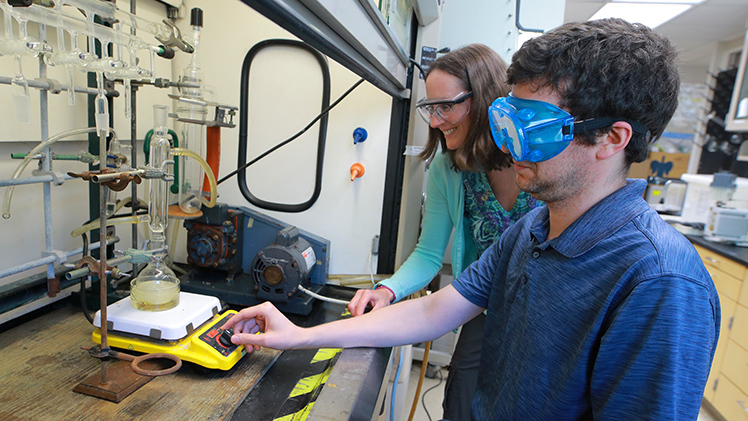The U.S. Department of Energy’s Argonne National Laboratory and The University of Toledo launched a new research collaboration with lead battery manufacturers to improve battery cycling efficiency for longer battery life as new applications emerge in an increasingly decarbonized market.
President Biden’s February Executive Order to ensure resilient and diverse supply chains put the spotlight on the need for the U.S. to assert global leadership with home-grown technology to assist in the transition to an electric and decarbonized future. High-capacity batteries will help to enable that process.

Dr. Cora Lind-Kovacs, professor in the Department of Chemistry and Biochemistry, and Brandon Russell, a Ph.D. candidate, adjust the temperature on a reflux reaction to produce a model expander molecule as part of their new research collaboration.
Advanced lead batteries, which are fully recyclable and for which recycling capacity already exists in the U.S., hold the promise of a truly sustainable U.S. battery energy storage industry.
The new research collaboration will work to identify methods to extend the life of lead batteries, already known for their low cost, durability and sustainable circular economy. They are ubiquitous and found in applications including automotive, agriculture, defense, telecommunications, logistics and warehousing, and renewable energy.
Led by Argonne’s Material Science Division in collaboration with Dr. Cora Lind-Kovacs, professor in the UToledo Department of Chemistry and Biochemistry, the research team over the next few years will conduct an atomic level examination of organic materials, also known as expanders.
Joining Argonne and UToledo are five U.S. lead battery companies: Crown Battery, Fremont, Ohio; Clarios, Milwaukee; EnerSys, Reading, Penn. East Penn Manufacturing, Lyon Station, Penn.; and RSR Technologies, Dallas.
“We are excited to collaborate with Argonne National Laboratory and the American Battery Research Group to investigate the atomic level mechanism of how expander molecules interact with the different lead species present in batteries,” Lind-Kovacs said. “This is a great opportunity to use our expertise in materials chemistry at UToledo to work closely with several companies to help address a relevant industrial problem.”
UToledo and Argonne National Laboratory will target lignosulfonate, a naturally occurring organic material used in the lead battery’s negative plates, to maintain the optimum flow of energy from the battery.
“I’m excited to work on this project as a graduate student and grateful for the opportunity to learn from such experienced people,” said Brandon Russell, a UToledo Ph.D. candidate working in Lind-Kovacs’ laboratory. “I can’t wait to see what we discover.”
U.S. Representative Marcy Kaptur, chair of the U.S. House Appropriations Energy and Water Development Subcommittee, helped form the consortium by bringing UToledo’s unique capabilities together with Argonne National Laboratory and the five companies.
“This partnership can help industry meet society’s demanding requirements in vital industries like transportation and electric power,” Kaptur said. “UToledo’s chemistry department will bring their expertise to help meet the growing need for more efficient and sustainable rechargeable batteries to support a changing economy.”
Hal Hawk, president of Fremont, Ohio, battery manufacturer Crown Battery, said his company has had a longtime and fruitful relationship with UToledo.
“They have helped our company with important research, and we look forward to having the University’s expertise deployed in this new national consortium with others in the lead battery industry.”
The U.S. lead battery industry has an annual economic impact of $26.3 billion with more than 92,000 direct and indirect jobs across 38 states. Lead batteries are a baseline energy storage technology used in automotive, telecommunications, electric power, mining, agriculture, marine and data centers. They are the most recycled product in the world, boasting a 99% recycling rate. Lead batteries provide 70% of the global rechargeable energy storage market and have significant potential for even better performance to serve increasingly demanding requirements for vehicle electrification and the integration of renewable power to the electric grid.